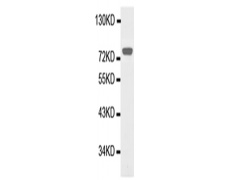中文名稱(chēng):兔抗BCL2L13多克隆抗體
|
Background: |
Apoptosis is defined as a set of cascades which, when initiated, program the cell to undergo lethal changes such as membrane blebbing, mitochondrial breakdown and DNA fragmentation. The Bcl-2 family of proteins plays a central regulatory role in apoptosis. Bcl-rambo, a member of the Bcl-2 family, localizes to the mitochondria and, like other Bcl-2 family members, contains all four BH domains. Although Bcl-rambo shares structural similarity to other Bcl-2 members, it differs from them in its unique C-terminal region. Bcl-rambo has a 250 amino acid sequence containing two tandem repeats that preceeds the membrane anchor region at its C-terminus. Additionally, it is the membrane anchor C-terminal region of Bcl-rambo, not its Bcl-2 homology motifs, that is responsible for its pro-apoptotic activity. Bcl-rambo induces apoptosis when overexpressed and appears to do so by promoting mitochondrial cyto-chrome c release. It may also facilitate the activation of caspase-3. |
|
Applications: |
WB |
|
Name of antibody: |
BCL2L13 |
|
Immunogen: |
Fusion protein of human BCL2L13 |
|
Full name: |
BCL2-like 13 (apoptosis facilitator) |
|
Synonyms: |
BCL2L13; MIL1; Protein Mil1; BCL-RAMBO; Bcl2-L-13 |
|
SwissProt: |
Q9BXK5 |
|
WB Predicted band size: |
53 kDa |
|
WB Positive control: |
Jurkat cells |
|
WB Recommended dilution: |
500-2000 |

 購(gòu)物車(chē)
購(gòu)物車(chē) 幫助
幫助
 021-54845833/15800441009
021-54845833/15800441009
